Mentoring Sessions
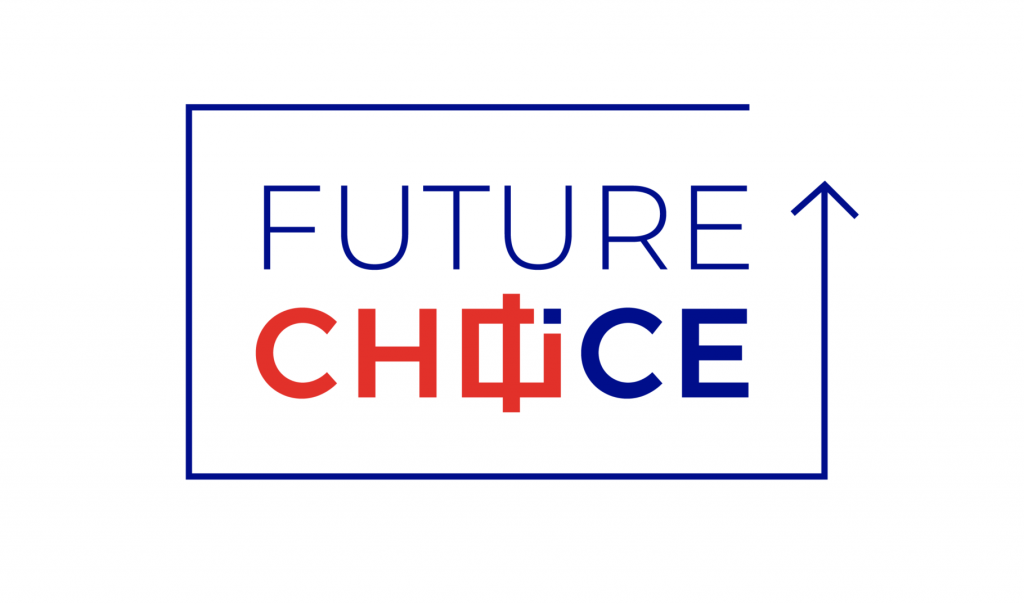
As part of the Future CHOICE initiative aimed at aspiring China experts, the CHOICE team introduced a series of exclusive mentoring sessions aimed at fostering the soft skills of junior researchers and analysts on China in CEE and beyond.
During these unique meetings, leading specialists in the field and contributors to the CHOICE network took up the role of mentors in order to advise their younger counterparts on the obstacles they may encounter when conducting research on China and shared their experience that shaped their career paths. Future CHOICE mentoring sessions provided much-needed space for intensive Q&A sessions and a small-group interaction on plenty of relevant topics, both on a professional as well as personal level.
In the feedback on the program, the participants found the sessions inspiring and also motivating. The openness of all the speakers, the wealth of their professional experience and perhaps most importantly their willingness to share personal stories and insights led to interactive discussion with the participants. The sessions highlighted the need to provide an open environment for informal debates, where participants could learn skills that are not readily available elsewhere, but are crucial for a successful career in the field.
Past Editions
Edition 3
Edition 3, Session 1: Mastering Interview Techniques
October 24, 2023
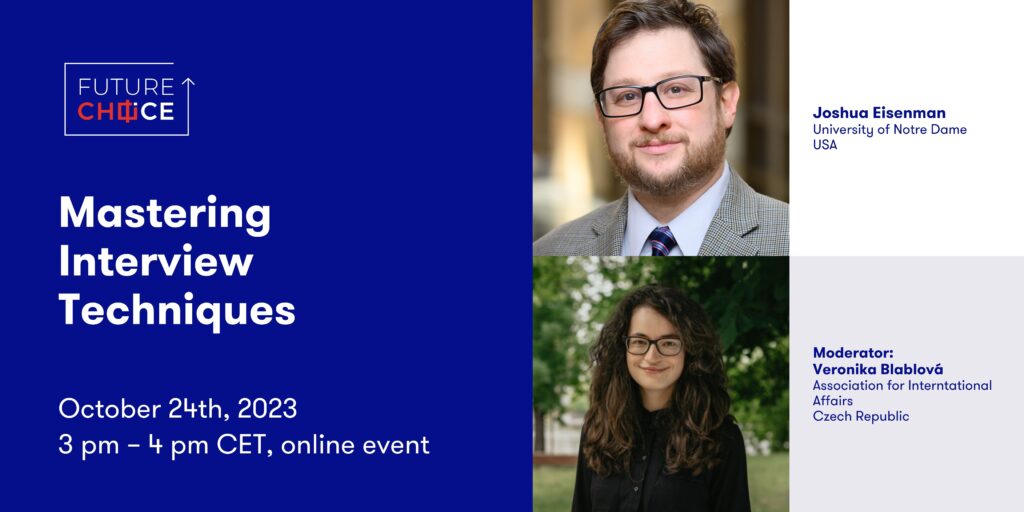
The first session of this mentoring series was devoted to a topic frequently requested by the Future CHOICE community – interview techniques. The event covered tips related to communicating with interviewees from different geographical and cultural backgrounds, with a special emphasis on Chinese politicians, academics and journalists. The event focused on the entire research process from preparation of the interviews to handling biases and ethical concerns.
Speaker:
Joshua Eisenman – Associate Professor of Politics at the the Keough School of Global Affairs at the University of Notre Dame
The session was moderated by Veronika Blablová from the Association for International Affairs (AMO), the Project Coordinator of the Future CHOICE initiative.
Edition 3, Session 2: Understanding a Survey
December 6, 2023

The December session centered around the art of survey design, with a special focus on designing surveys in different countries and the intricacies of this process in China. Our expert speaker shared her wealth of knowledge and practical experience, addressing the issue of conducting surveys in various countries and interpreting the results, especially those gathered by Chinese organizations.
Speaker:
Laura Silver – Associate Director at Pew Research Center
The session was be moderated by Veronika Blablová from the Association for International Affairs (AMO), the Project Coordinator of the Future CHOICE initiative.
Edition 3, Session 3: Research Partnerships and Funding
February 22, 2024
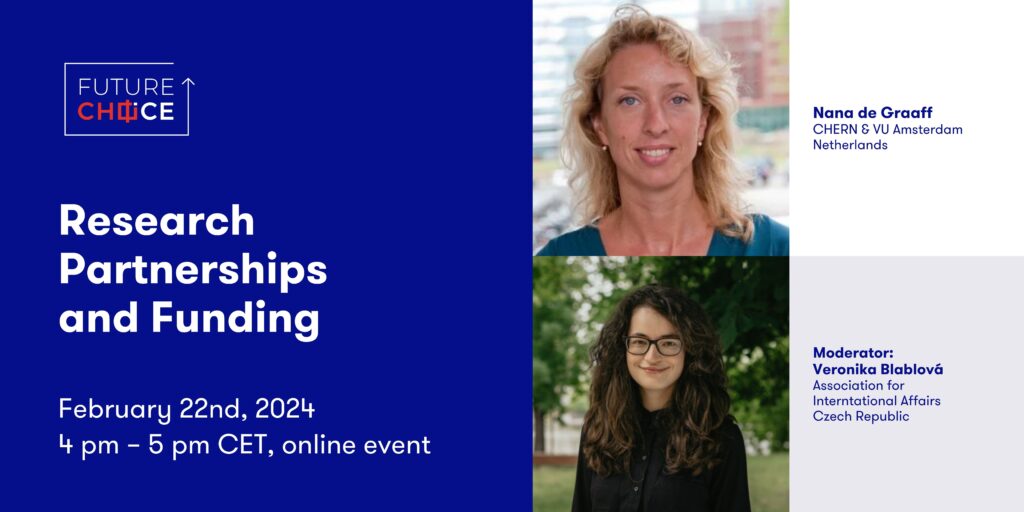
This session offered a unique opportunity to discuss research partnerships and funding schemes with Dr. Nana de Graaff, Chair of the “China In Europe Research Network”, known as CHERN. This project predominantly focuses on deepening knowledge on China, enabling interdisciplinary and cross-regional cooperation, and fostering capabilities of junior researchers. This online event, therefore, shed more light on the strategies to build long-term partnerships with other researchers and organizations, and how to subsequently manage a network of partners during a research project. Furthermore, this session provided tips regarding short-research stays and applying for funding, including different funding schemes that are available for early career researchers.
Speaker:
Dr. Nana de Graaff – Chair of CHERN & Associate Professor in International Relations at VU Amsterdam, Netherlands
The session was moderated by Veronika Blablová from the Association for International Affairs (AMO), the Project Coordinator of the Future CHOICE initiative.
Edition 3, Session 4: Contributing to a China-focused Journal
April 11, 2024
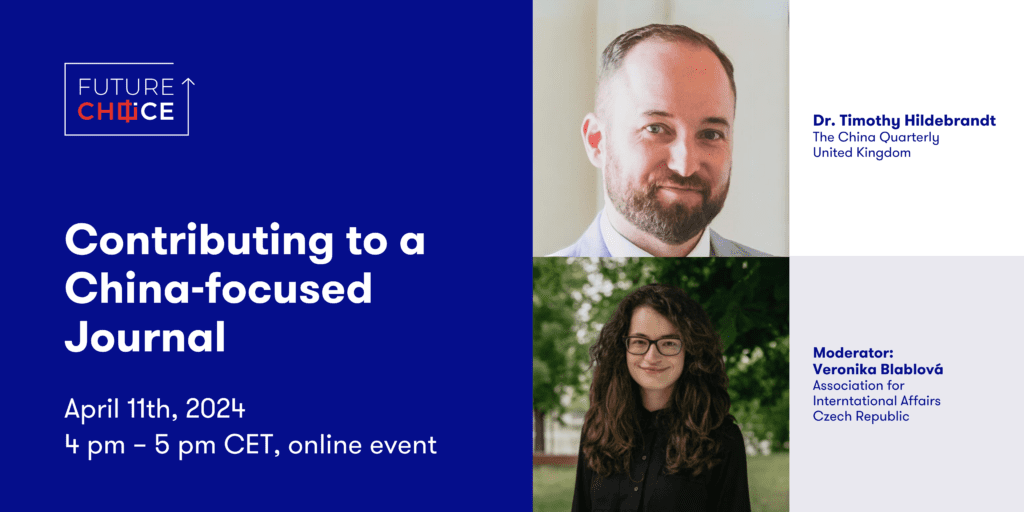
During this mentoring session, Dr. Timothy Hildebrandt, a seasoned editor of The China Quarterly, shared his invaluable experience and strategies for successfully contributing to prestigious academic journals. Participants learned how to navigate the submission process, from understanding common pitfalls in writing on China to responding effectively to peer review feedback. The session aimed to demystify the publication process, offering practical tips on selecting the right journals and best practices for writing academic articles. This opportunity provided early career China researchers with direct insight into the editorial expectations and how to enhance their research’s appeal to top-tier journals.
Speaker:
Dr. Timothy Hildebrandt – Editor of The China Quarterly & Associate Professor of social policy and development at The London School of Economics and Political Science (LSE)
The session was be moderated by Veronika Blablová from the Association for International Affairs (AMO), the Project Coordinator of the Future CHOICE initiative.
Edition 3, Session 5: Lecturing about China
May 15, 2024
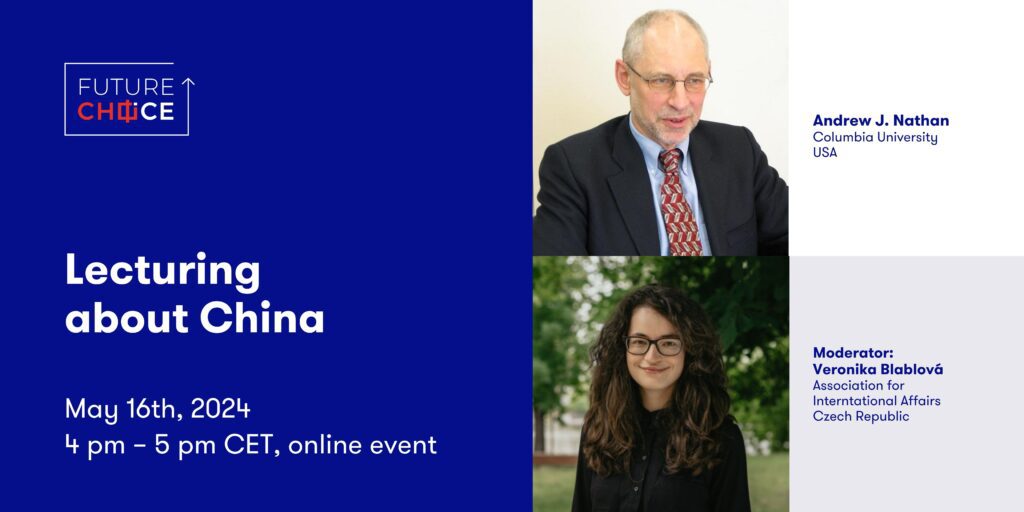
During this mentoring session, Professor Andrew J. Nathan, a distinguished faculty member at Columbia University since 1971, shared his extensive experience in lecturing about Chinese politics and foreign policy. This session was designed specifically for PhD students and early career researchers who are preparing to lecture about China. Participants received essential advice and insights to effectively engage and educate their audience about China’s rich history, diverse culture, and significant global impact. Topics included developing lectures, selecting appropriate information sources, integrating interdisciplinary perspectives, utilizing modern pedagogical techniques, and addressing sensitive topics.
Speaker:
Professor Andrew J. Nathan – Professor of Political Science at Columbia University, New York, USA
The session was moderated by Veronika Blablová from the Association for International Affairs (AMO), the Project Coordinator of the Future CHOICE initiative.
Edition 2
Edition 2, Session 1: Where should I start? A career path to China observer
November 10, 2022
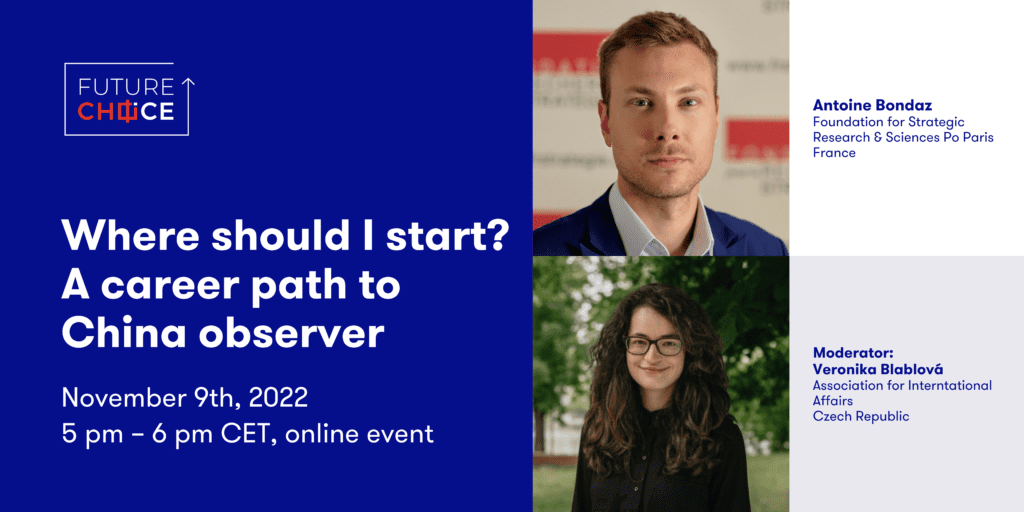
The first session of the second mentoring season delineated the differences of various career paths that China observers may take, with a special focus on working as a China analyst in academia and think-tanks.
Speaker:
Dr. Antoine Bondaz – Research Fellow at the Foundation for Strategic Research & Associate Professor at Sciences Po Paris.
The session was moderated by Veronika Blablová from the Association for International Affairs (AMO), the Project Coordinator of the Future CHOICE initiative.
Edition 2, Session 2: It’s the data, stupid: Using OSINT methods in China research
February 28, 2023
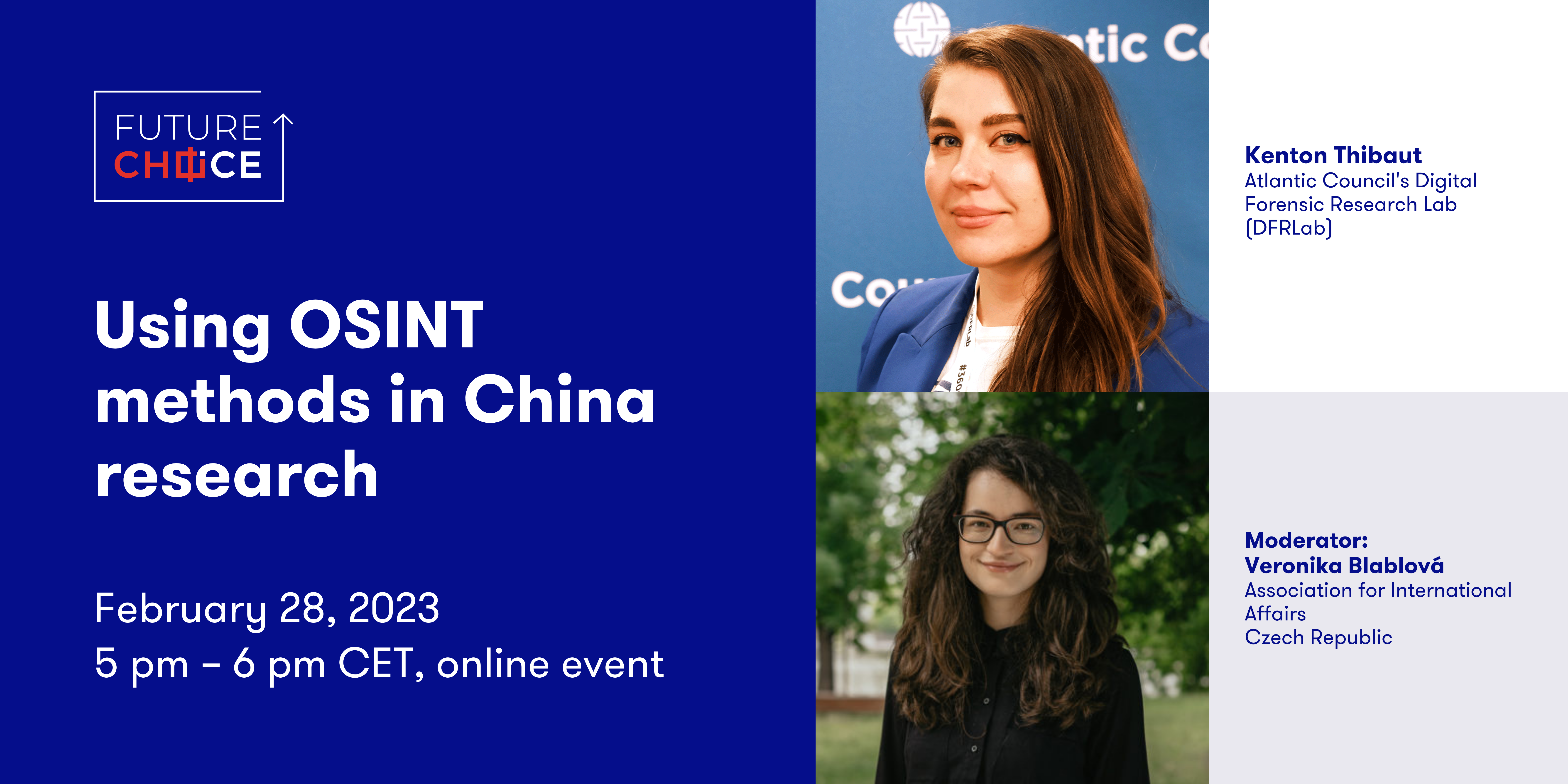
This session covered the use of social media platforms in China and provided a broad overview of influence operations and platforms within the Chinese state. It delved into research methods for understanding Chinese information operations on Chinese social media platforms and included examples and recommended readings for further inspiration. This session was designed for all junior researchers aiming to bring their research to a new level and gain an overview of OSINT methods available.
Speaker:
Kenton Thibaut – Resident China Fellow of the Atlantic Council’s Digital Forensic Research Lab (DFRLab).
The session was coordinated by Veronika Blablová from the Association for International Affairs (AMO), the Project Coordinator of the Future CHOICE initiative.
Edition 2, Session 3: Where should I look for information? Tips on working with sources
March 29, 2023
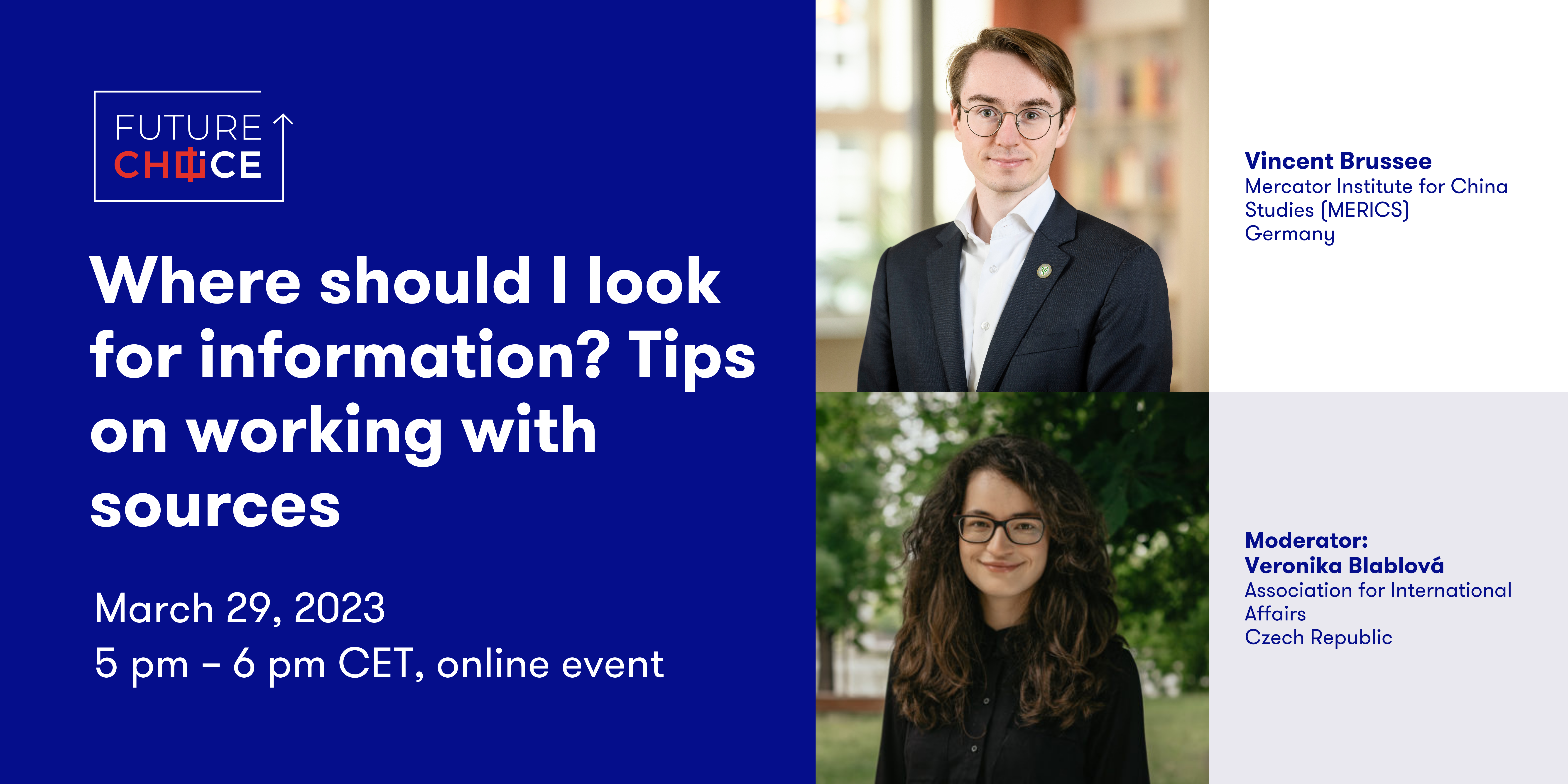
With so many sources on China, ranging from news reporting, policy papers and studies to podcasts, books, youtube channels and social media posts, it might be hard not to get lost in the amount of information. The third session of the new mentoring season was focused on strategies for working with Chinese sources and data science and its benefits in China research including China’s policy documents.
Speaker:
Vincent Brussee – Analyst at Mercator Institute for China Studies (MERICS)
The session was moderated by Veronika Blablová from the Association for International Affairs (AMO), the Project Coordinator of the Future CHOICE initiative.
Edition 2, Session 4: Know who is watching you: Safe research practices for China observers
May 23, 2023

Whereas China analysts may benefit from information gathered from online sources, it is crucial to acknowledge that such research also comes with significant risks for your personal and research data security. The May mentoring session shed more light on best practices to conduct research on China while also ensuring safety of junior researchers.
Speaker:
Michal Thim – Threat Intelligence & OSINT Analyst, Czech Republic
The session was moderated by Veronika Blablová from the Association for International Affairs (AMO), the Project Coordinator of the Future CHOICE initiative.
Edition 2, Session 5: Using ChatGPT in China research
June 7, 2023
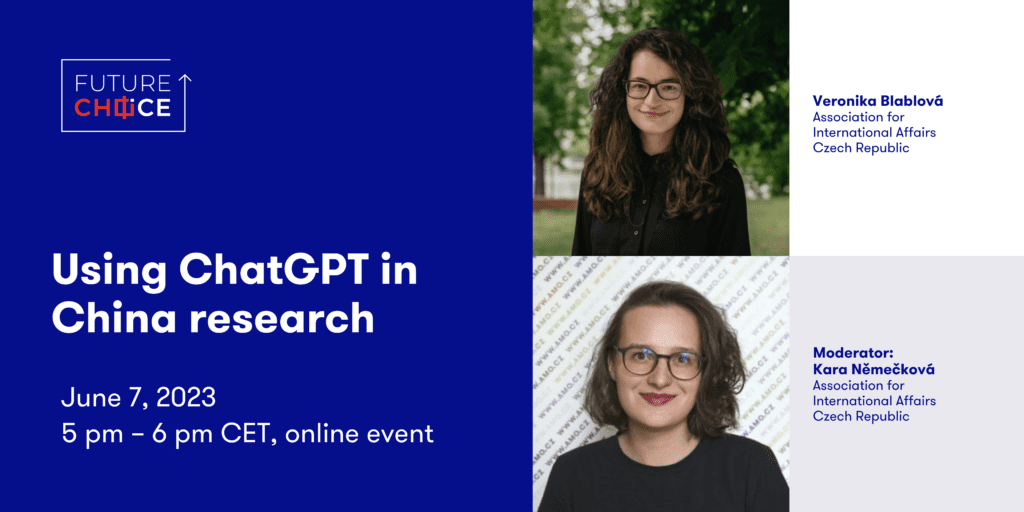
In the final session of this edition, early career researchers and students delved into the world of ChatGPT, a powerful language model developed by OpenAI. Specifically tailored for participants with limited or no prior knowledge of this model, the workshop emphasized its applications in research and analysis. The participants had the chance to explore the possibilities of ChatGPT and gain insights into its limitations.
Speaker:
Veronika Blablová – Data Analyst at the Association for International Affairs (AMO), Czech Republic
The session was moderated by Kara Němečková from the Association for International Affairs (AMO), the External Relations Manager of CHOICE and MapInfluenCE.
Edition 1
Edition 1, Session 1: The Making of a Next-Generation China Scholar
Ocober 19, 2021
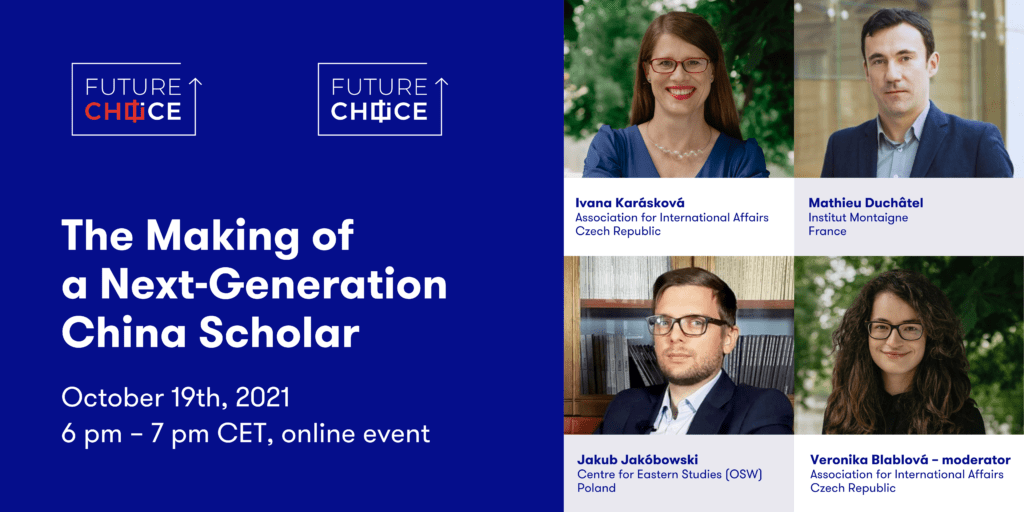
The very first Future CHOICE mentoring session was devoted to the increasingly lengthy list of obstacles that China researchers are likely to face in coming years and how best to contend with these challenges.
Speakers:
Dr. Ivana Karásková – China Research Fellow and a China Projects Lead at the Association for International Affairs (AMO), Czech Republic
Dr. Jakub Jakóbowski – Senior Fellow at the China-EU Programme at the Centre for Eastern Studies (OSW), Poland
Dr. Mathieu Duchâtel – Resident Senior Fellow and Director of Asia Program at Institut Montaigne, France
The session was moderated by Veronika Blablová from the Association for International Affairs (AMO), the Project Coordinator of the Future CHOICE initiative.
Edition 1, Session 2: Challenges of Reporting & Pursuing Academic Career in China
December 7, 2021
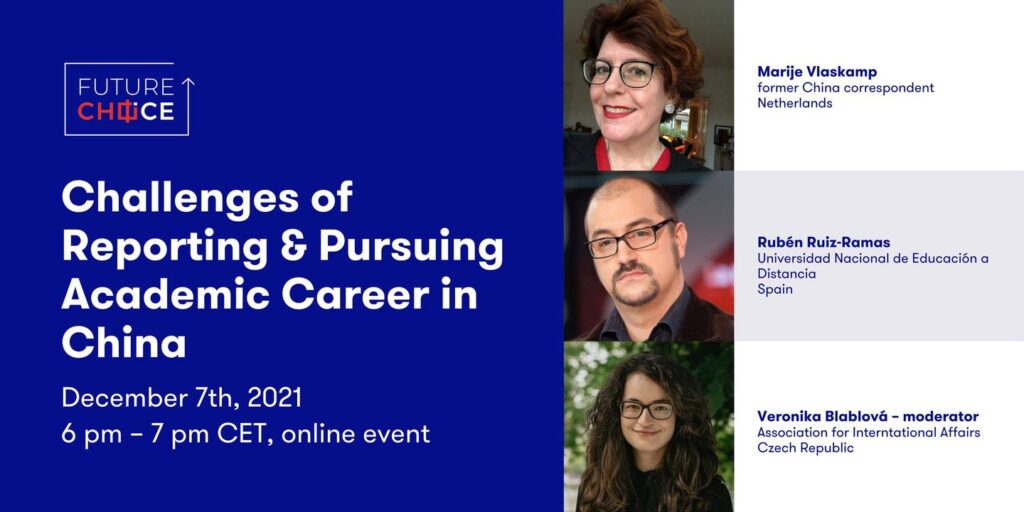
The December session concentrated on sharing our experts’ insights regarding the performance of various professional activities in China, each of whom have a wealth of experience working on the ground in the country. Gathering information in China is increasingly arduous due to political and other constraints. Thus, it is crucial to not only build on experience, but address the new challenges that have emerged as of late. This session was designed for aspiring researchers and journalists considering a career in China-related topics and especially those interested in working on the ground in China.
Speaker:
Marije Vlaskamp – journalist and former China correspondent, Netherlands
Rubén Ruiz-Ramas – Assistant Professor of the Department of Political Science and Administration at the UNED, Spain
The session was moderated by Veronika Blablová from the Association for International Affairs (AMO), the Project Coordinator of the Future CHOICE initiative.
Edition 1, Session 3: Studying in China and Taiwan
February 16, 2022
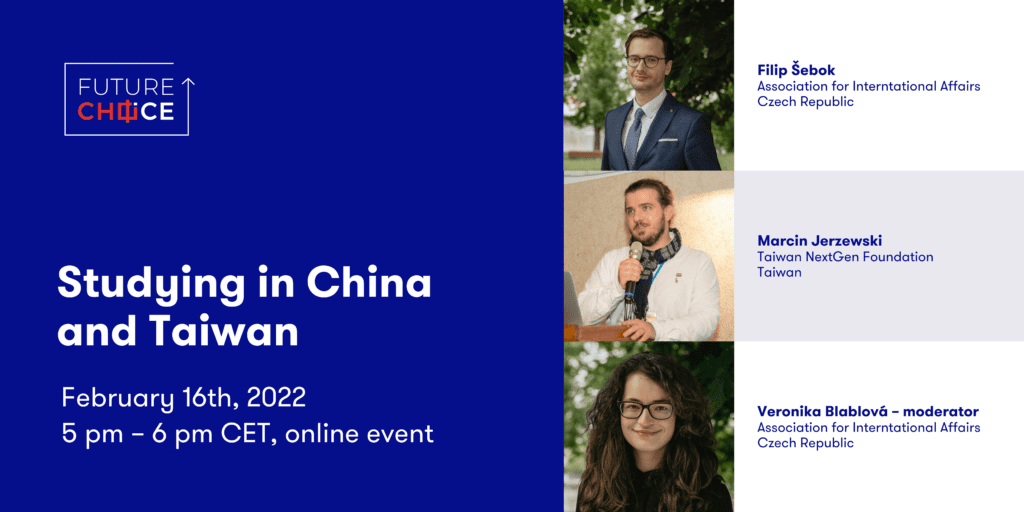
The first session of 2022 was dedicated to sharing experiences with various opportunities available for students of China studies and related fields. Firsthand experience is an invaluable asset in pursuing a career as China experts. Studying in China or Taiwan, therefore, represents a key advantage for those seeking to immerse themselves in the local environment working on language but also other skills. Our speakers, all of whom have experience with long-term degree studies in China and Taiwan, discussed various practical topics such as university requirements, lecture style, exams and final theses, and more. This discussion aimed to touch upon student life, interactions with local and international peers, immersion in local culture, finding internship opportunities as well as some common challenges encountered.
Speakers:
Marcin Jerzewski – Research Fellow, Taiwan NextGen Foundation
Filip Šebok – Project Manager and China Research Fellow, Association for International Affairs (AMO)
The session was moderated by Veronika Blablová from the Association for International Affairs (AMO), the Project Coordinator of the Future CHOICE initiative.
Edition 1, Session 4: How to Make an Impact
April 25, 2022
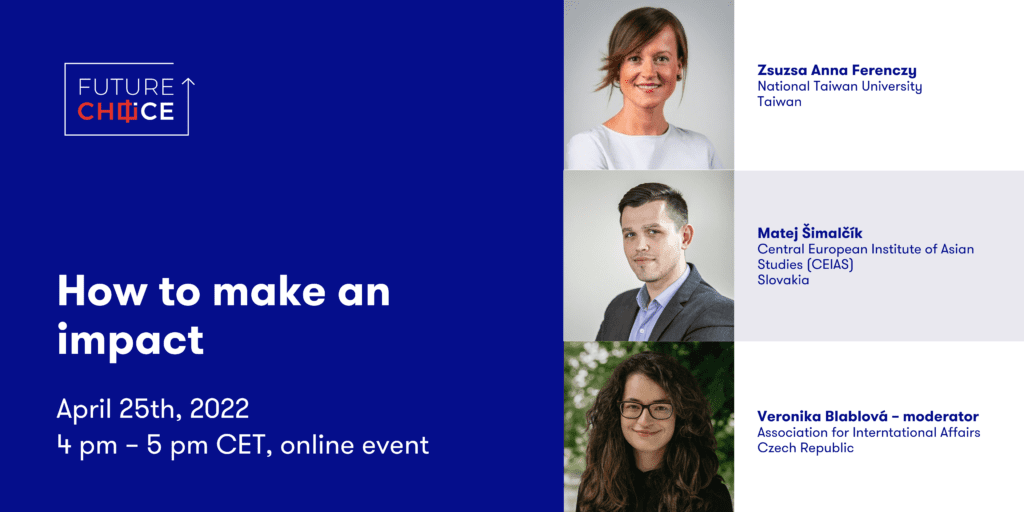
The April mentoring session aimed to provide our experts’ insights and strategies on contributing to public debate on China-related issues and more. This session’s objective was to share practical advice on making your work impactful, both in content and reach. The discussion was devoted to the effective utilization of social media, strategies for media appearances, and tips on how to best utilize each opportunity. Similarly, this debate touched upon dealing with reactions to the media appearances and strengthening confidence in your research area.
Speakers:
Zsuzsa Anna Ferenczy – Ph.D. Research Fellow at the European Union Centre at National Taiwan University, Taiwan
Matej Šimalčík – Executive Director of the Central European Institute of Asian Studies (CEIAS), Slovakia
The session was moderated by Veronika Blablová from the Association for International Affairs (AMO), the Project Coordinator of the Future CHOICE initiative.
Edition 1, Session 5: Improving Public Speaking Skills
June 8, 2022
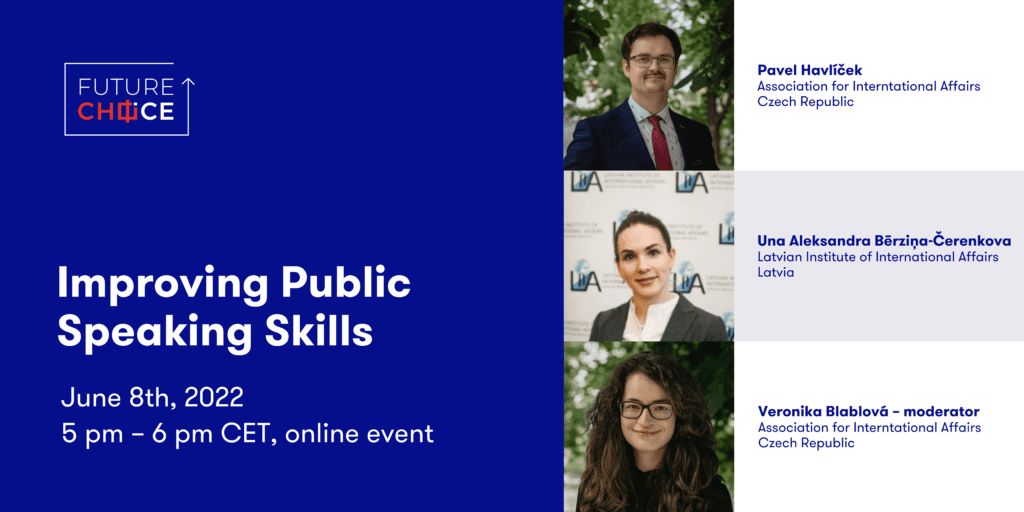
The final session of the first series provided our experts’ insights and personal strategies for strengthening confidence in public speaking and improving presentation skills. This session’s objective was to share practical advice based on the abundant experience of CHOICE experts on overcoming stress or self-doubt when responding to media inquiries, delivering a lecture or speaking at a conference.
Speaker:
Dr. Una Aleksandra Bērziņa-Čerenkova – Head of the Asia program at the Latvian Institute of International Affairs, Latvia
Pavel Havlíček – Research Fellow at the Association for International Affairs (AMO), Czech Republic
The session was moderated by Veronika Blablová from the Association for International Affairs (AMO), the Project Coordinator of the Future CHOICE initiative.